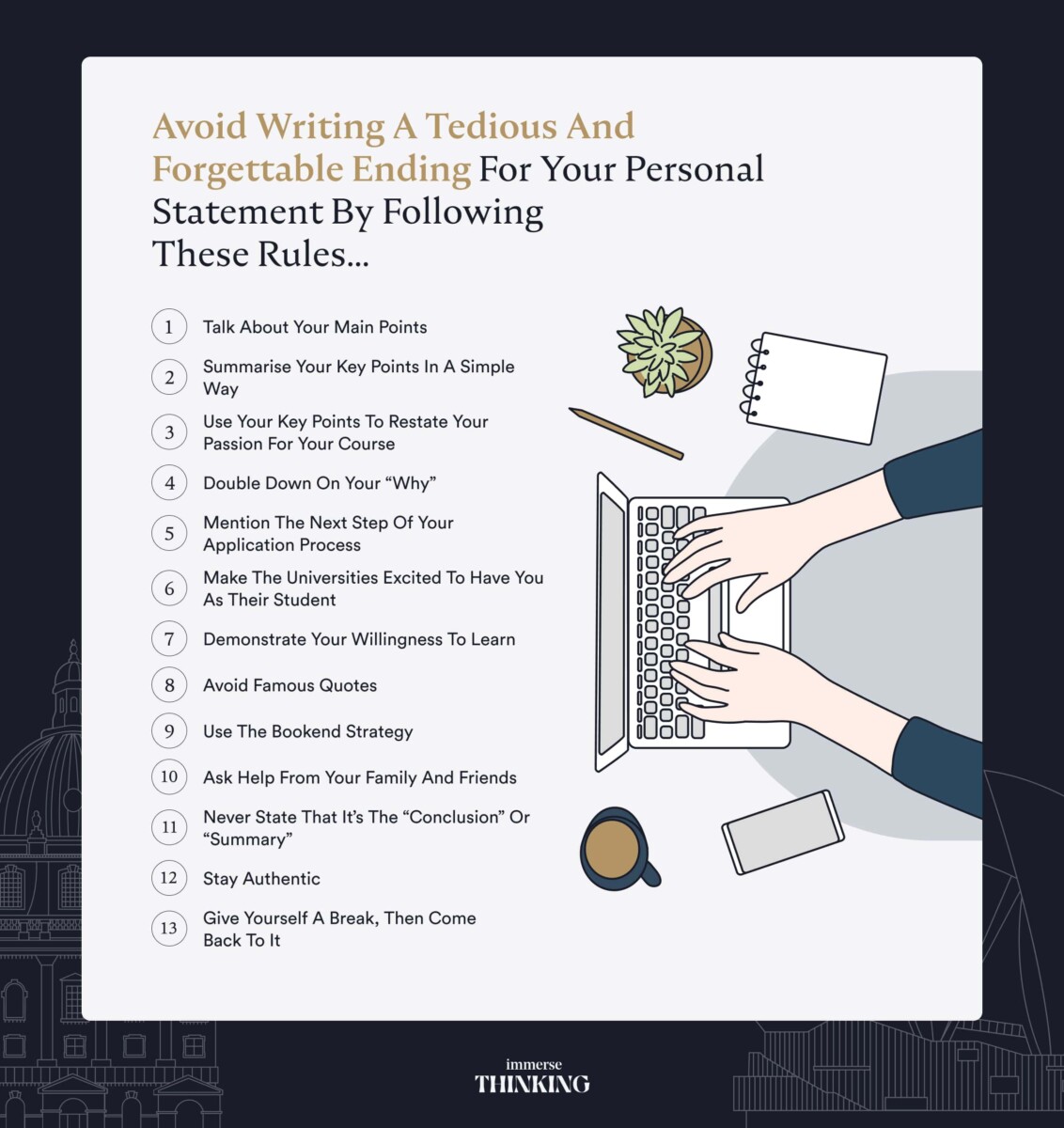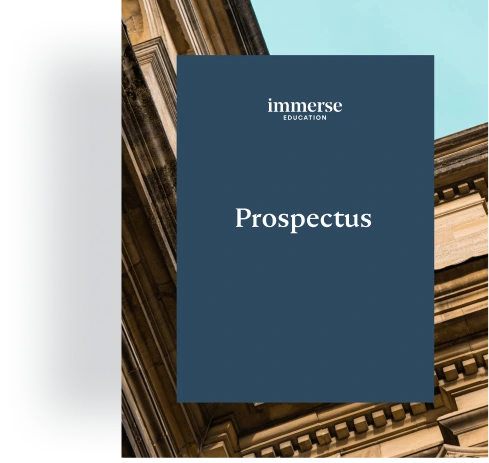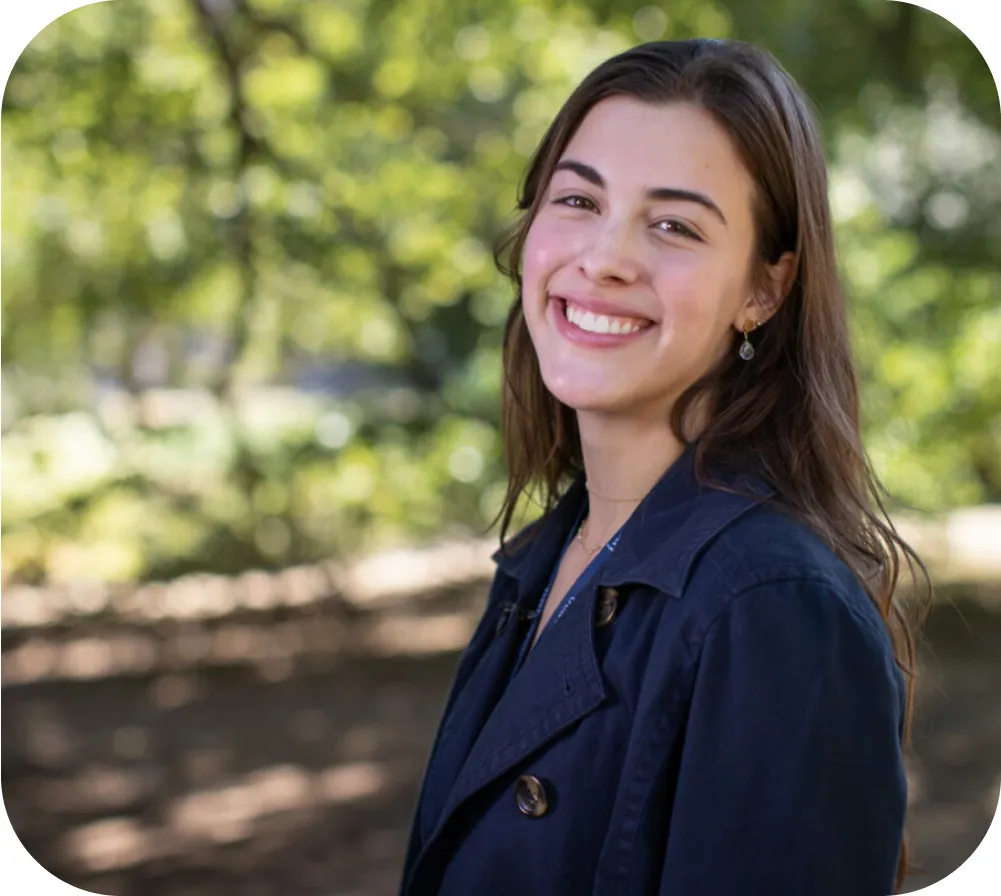Students are often unsure of how to end a personal statement. A strong conclusion makes all the difference in whether your application gets noticed by admissions officers or not.
If you’ve just finished writing your personal statement and you’re stuck on your ending, then don’t worry! This article will walk you through the essentials of personal statement conclusions.
Avoid writing a tedious and forgettable ending for your personal statement by following these rules.
Talk About Your Main Points
Don’t end your final paragraph by stating what you’ve never mentioned in the body of your personal statement. Remember, the purpose of your conclusion is to wrap up the package.
You shouldn’t say, “My experiences kindled my passion for engineering,” if you didn’t mention these “experiences” in the first place!
So actually summarising your key main body points is a great conclusion in many cases.
Summarise Your Key Points In A Simple Way
After reading thousands of personal statements, the admissions committee will be happy to see you concluding your personal statement with a clear summarisation of the vital points.
Go over your personal statement and jot down the main takeaway of each paragraph. Once you have that list, find a way to integrate them into your conclusion.
You can dedicate a sentence to each key point, tie them all together, and you now have a conclusion that does what it’s supposed to do!

Use Your Key Points To Restate Your Passion For Your Course
If you’re wondering how to end your personal statement using your key points, use them to restate your passion for the course you’re applying for.
Say your key points including your skills and experiences, and wrap them up by saying, “With the [your specific skills] and [your specific experiences] I’ve gained over the years, I’m committed to [mention your course].”
By doing so, you’re hitting two birds with one stone. One, you’re reminding the admissions committee that you have the skill set necessary to succeed in your course. Two, you’re demonstrating your dedication to your desired course.
Double Down On Your “Why”
Another powerful ending is to remind the reader of your “why.” Many students pursue their chosen course because they’re not sure what else to take.
So being clear on your purpose immediately sets you apart from the rest.
To do this, take the most heart-moving story from the body of your personal statement on what inspired you to apply for your course. Mention the main idea of it in a sentence or two, then end with a “for this reason, I believe pursuing [mention course] is the best way to achieve my [state your why].”
If your course is related to education, perhaps your “why” is to help children learn by allowing them to show how they learn best.
Say you’re writing a medical personal statement. Maybe your “why” is to forward technology that helps safeguard the elderly from falling accidents because you witnessed your grandparent suffer injuries from a fall when you were young.
Doubling down on your “why” shows your conviction and direction on why you’re applying for your course.
Mention The Next Step Of Your Application Process
What’s the next step after the admissions committee accepts your personal statement? For many courses, they’ll call you up for an interview. Go ahead and mention this in your conclusion!
Write along the lines of “I’m looking forward to dedicating myself to this course, and I would love to receive an invitation for the interview.”
The reader will right away recognise that you’ve done your research. You know what the next step should be. You are serious about this application!
Make The Universities Excited To Have You As Their Student
Studying at a university is not merely a means to an end. It’s a profound journey in and of itself! You’ll meet new colleagues, form lifelong communities, and discover mentors who will guide you along with your future career.
Think of them when you’re pondering on how to end a personal statement. What can you contribute as a student to make the university a better place? Demonstrate your excitement in meeting them, building relationships with them, and serving them!
A statement as straightforward as “I am eager to establish new, lifelong relationships and use my [mention your skills] to help make the university a better place for learning and community-building.”
Demonstrate Your Willingness To Learn
Universities exist to train and mould students, not the other way around! A little humility goes a long way. Show yours by demonstrating your willingness to learn. Nothing excites teachers more than willing students.
To pull this off, make sure you know what values your course upholds. It could be service, excellence, inclusivity, and so on. State in your conclusion that “I’m looking forward to learning how to embody [write down the course’s values you resonate with], to grow and succeed in [mention your field of study].”
There’s so much value packed in this simple personal statement ending. Tweak it and make it yours!
Avoid Famous Quotes
Many students insert famous quotes from well-known persons when ending their personal statements. Avoid this tactic as much as possible because you’re driving attention away from YOU as the applicant.
If you want to include famous quotes, put them at the beginning of your personal statement to grab attention. To keep your reader’s attention focused on you in the end, why not come up with a memorable, relevant quote of your own?
Use The Bookend Strategy
Bookends are sturdy objects placed at either end of upright books to keep them standing. When you translate that into writing, the bookend strategy is when the introduction and conclusion statements connect to support the body between them.
You may start your personal statement with a heart-wrenching story about how you watched your beloved pet die of the wrong diagnosis. Then, for your conclusion, you can call back on this story and state how this event fuels you to pursue veterinary practice.
The bookend strategy is a clean and efficient way how to end your personal statement.
Ask Help From Your Family And Friends
If you’re still stuck on how to end a personal statement, don’t be afraid to ask for help. Approach your family and friends because they know you more than anyone. Read to them the introduction and body of your personal statement.
Ask them what particular line struck them the most. Maybe they know something about you that you missed including in your personal statement. What characteristics do they see in you that will help you succeed in your course?
Gather their answers in one place, and after reading them in one go, you now have a decent idea of what to emphasise in your conclusion statement.
Never State That It’s The “Conclusion” Or “Summary”
The most boring, generic way to end a personal statement is to write “In conclusion” or “In summary.” It’s actually one of the topics we cover in what not to put in a personal statement.
Avoid this writing style at all costs. A good conclusion statement doesn’t require explicit announcements.
By its style and structure alone, the reader knows immediately they’re about to read a lasting statement. So don’t hesitate to proceed straight to the major points. As long as the conclusion connects seamlessly with the previous paragraph, you’re good to go!
Stay Authentic
Universities hold honesty in high esteem. Show authenticity and honesty in your personal statement beginning with an attention-grabbing introduction to a strong conclusion.
The best way to radiate honesty in your personal statement is to write from the right mindset. When you work on your personal statement, your objective is to show who you are and demonstrate why you are a worthy candidate for the course.
Don’t try to impress. If you come from that standpoint, you’re more likely to add embellishments. The experienced admissions committee can smell insincere personal statements from a mile away. So stick with who you are and let your personality shine through.
Give Yourself A Break, Then Come Back To It
When working on how to conclude a personal statement, you need to give yourself time. After writing a rough draft of your conclusion statement, take a break and return to it after a few days.
When you return to it, you’ll be surprised to notice details you haven’t seen before. Edit as you like, and make it better. Keep the old versions of your conclusion at hand so you can readily compare them with your newest, edited text. Compare and choose which one sounds better.
5 Bad Examples For A Personal Statement Conclusion
These are 5 personal statement examples for conclusions that don’t meet the criteria outlined above.
- In this application essay, I have made it clear I am an outstanding candidate for a degree because I think everyone will love my positive attitude and I deserve it.
- In summary, you can see my highlighted qualifications and experience, I know they’re not the best, but I want to stress that my passion for this field is what sets me apart as a candidate. It shouldn’t matter if the others are more qualified or experienced than me.
- Remember the skills I have, that’s really what sets me apart from other students, they don’t have what it takes to break the rules creatively and not follow the book.
- Finally, I would like to thank you for considering me for this opportunity and I hope you will make the right decision by choosing me, otherwise, I may cry and be disappointed.
- As a final note, it’s easy to see how qualified I am for this degree and how I will excel in it – but you should accept me because I’m cool and will get along with everyone else.
5 Amazing Examples Of A Personal Statement Ending
- In conclusion, I am excited about the opportunity to study computer science at this university. My passion for technology, combined with my programming skills and experience, make me an ideal candidate for the program. I am eager to learn from the esteemed faculty and contribute to the research community. I am confident that this program will enable me to achieve my career goals and make a meaningful impact in the field of technology.
- In summary, I have always been fascinated by the human body and its functions. My experience in volunteering in hospitals, combined with my academic record, makes me confident in my ability to handle the rigours of a medical degree. I am excited about the opportunity to study at this esteemed university and to contribute to the field of medicine through research and patient care.
- To wrap things up, I am excited to pursue a degree in Mechanical Engineering at this university. My passion for designing and building, combined with my experience in physics and mathematics, make me confident that I have the knowledge and skills to excel in this program. I am eager to learn from the esteemed faculty and contribute to the field of mechanical engineering through research and innovation.
- Finally, I am honoured to be considered for a law degree at this university. My passion for justice, combined with my research skills and experience, make me an ideal candidate for the program. I am excited about the opportunity to learn from the esteemed faculty and to contribute to the legal field through research and practice.
- As a final note, I am excited to pursue a degree in Environmental Science at this university. My passion for the environment, combined with my experience in environmental research, makes me confident that I have the knowledge and skills to make a meaningful impact in this field. I am eager to learn from the esteemed faculty and contribute to the field through research and conservation efforts.
How Long Should the Conclusion To A Personal Statement Be?
A personal statement conclusion should be 150-200 words long and leave a positive lasting impression on the reader. A UCAS personal statement should be 4000 characters long, making the conclusion 705-940 characters long – this is just a rough estimation based on the average number of characters per word (4.7).
Do You Feel More Confident Writing A Personal Statement Conclusion?
To end your personal statement in the best possible way, you need to know the body’s key points. Use them as pillars when deciding which direction your conclusion takes.
Will you highlight your future goals? Maybe you want to focus on your why? Take the time to decide. And if you’re stuck, don’t hesitate to ask for help from your family and friends so you can leave a lasting impression on the applications committee.
How much did this article help you out? Don’t forget to bookmark this page for future reference!



